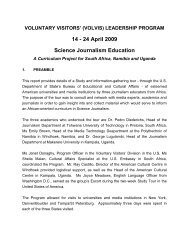Maliti. State of IFRS in Namibia. PowerPoint.pdf - Polytechnic of ...
Maliti. State of IFRS in Namibia. PowerPoint.pdf - Polytechnic of ...
Maliti. State of IFRS in Namibia. PowerPoint.pdf - Polytechnic of ...
- No tags were found...
Create successful ePaper yourself
Turn your PDF publications into a flip-book with our unique Google optimized e-Paper software.
STATE OF <strong>IFRS</strong> INNAMIBIABYPAUL N MALITI(BA, FCCA)Head <strong>of</strong> DepartmentACCOUNTING AND FINANCEPOLYTECHNIC OF NAMIBIA<strong>IFRS</strong> NAMIBIA 2009 1
ABBREVIATIONS GAAP – generally acceptedaccount<strong>in</strong>g practices IAS – <strong>in</strong>ternational account<strong>in</strong>gstandards <strong>IFRS</strong> – <strong>in</strong>ternational f<strong>in</strong>ancialreport<strong>in</strong>g standards ICAN – Institute <strong>of</strong> CharteredAccountants - <strong>Namibia</strong> PON – <strong>Polytechnic</strong> <strong>of</strong> <strong>Namibia</strong><strong>IFRS</strong> NAMIBIA 2009 2
RESEARCH PROBLEMS<strong>IFRS</strong> not appropriate for:• Small national economies• Small entities<strong>IFRS</strong> expensive venture especially for:• Small entities• Local entities<strong>IFRS</strong> no value addition• Only for general-purpose f<strong>in</strong>ancial statements<strong>IFRS</strong> NAMIBIA 2009 3
OBJECTIVESTo establish: Reasons for non-adoption / compliance Technical problems with <strong>IFRS</strong> adoption /compliance Benefits, if any<strong>IFRS</strong> NAMIBIA 2009 4
GAAP What is GAAP? Mandatory sources:• National laws Companies Act, Close Corporation Act,Credit Agreements Act• National account<strong>in</strong>g standards ICAN• Local stock exchange requirements <strong>Namibia</strong> Stock Exchange<strong>IFRS</strong> NAMIBIA 2009 5
GAAPNon-mandatory sources:• International account<strong>in</strong>g standards• Foreign statutory requirements Subsidiaries <strong>of</strong> multi-national corporations<strong>IFRS</strong> NAMIBIA 2009 6
ACCOUNTING FRAMEWORKMeasurement• Choice <strong>of</strong> account<strong>in</strong>g methods, e.g.DepreciationInventory valuationRecognition• Journals (daybooks)• LedgersDisclosure• F<strong>in</strong>ancial statements• Other f<strong>in</strong>ancial reports<strong>IFRS</strong> NAMIBIA 2009 7
FAITHFUL REPRESENTATIONTrue and fair view• Underly<strong>in</strong>g assumptionsGo<strong>in</strong>g concernAccrualsPrudenceConsistency• Qualitative characteristicsUnderstandabilityRelevanceMaterialityReliabilityAccuracyNeutralityTimel<strong>in</strong>ess<strong>IFRS</strong> NAMIBIA 2009 8
PURPOSE OF FRAMEWORK Development <strong>of</strong> future <strong>IFRS</strong> Harmonisation National standard sett<strong>in</strong>g Assist accountants & auditors Assist users <strong>of</strong> f<strong>in</strong>ancial statements<strong>IFRS</strong> NAMIBIA 2009 9
GENERAL-PURPOSE FINANCIALSTATEMENTS F<strong>in</strong>ancial position statement Performance statement <strong>State</strong>ment <strong>of</strong> changes <strong>in</strong> f<strong>in</strong>ancialposition <strong>State</strong>ment <strong>of</strong> changes <strong>in</strong> equity Disclosure <strong>of</strong> account<strong>in</strong>g policies<strong>IFRS</strong> NAMIBIA 2009 10
COMPLIANCE WITH <strong>IFRS</strong>Ensures fair presentation: Disclosure <strong>of</strong> compliance with <strong>IFRS</strong> Compliance relates to all <strong>IFRS</strong> Disclosure is no rectification for<strong>in</strong>appropriate account<strong>in</strong>g policies<strong>IFRS</strong> NAMIBIA 2009 11
DEPARTURE FROM <strong>IFRS</strong> Requires justification bymanagement Departure necessary for fairpresentation Details <strong>of</strong> such departure F<strong>in</strong>ancial effect <strong>of</strong> such departure<strong>IFRS</strong> NAMIBIA 2009 12
STUDENT RESERACHAn <strong>in</strong>vestigation on f<strong>in</strong>ancial report<strong>in</strong>g & adoption<strong>of</strong> <strong>IFRS</strong> <strong>in</strong> <strong>Namibia</strong>The application <strong>of</strong> IAS/<strong>IFRS</strong> by private companies<strong>in</strong> <strong>Namibia</strong>An <strong>in</strong>vestigation <strong>in</strong>to the adoption <strong>of</strong> IAS bycommercial banks <strong>in</strong> <strong>Namibia</strong>Investigative study on the degree to which FNBapplies IAS/<strong>IFRS</strong> with regard to group f<strong>in</strong>ancialstatements<strong>IFRS</strong> NAMIBIA 2009 13
RESEARCH FINDINGS<strong>Namibia</strong>n f<strong>in</strong>ancial statements compliantwith IAS/<strong>IFRS</strong>IAS/<strong>IFRS</strong> adds valueAudit op<strong>in</strong>ion confirm<strong>in</strong>g compliance withIAS/<strong>IFRS</strong>Qualified op<strong>in</strong>ion for departure or non-complianceIAS/<strong>IFRS</strong> facilitates understability &comparisonAll IAS/<strong>IFRS</strong> adopted except non-relevantstandards<strong>IFRS</strong> NAMIBIA 2009 14
RESEARCH FINDINGSProblems:Lack <strong>of</strong> qualified accountants – veryexpensiveUnfair presentation if IAS/<strong>IFRS</strong> notcomplied withNeed for separate IAS/<strong>IFRS</strong> for smallcompaniesFair valuation <strong>of</strong> assets and liabilities:• Measurement• Recognition<strong>IFRS</strong> NAMIBIA 2009 15
CONCLUSION <strong>Namibia</strong> alive to IAS/<strong>IFRS</strong> IAS/<strong>IFRS</strong> adds value (usefulness) Users <strong>of</strong> f<strong>in</strong>ancial statementsappreciate IAS/<strong>IFRS</strong> IAS/<strong>IFRS</strong> should apply to allcompanies Cost <strong>in</strong>evitable & justifiable<strong>IFRS</strong> NAMIBIA 2009 16
ACKNOWLEDGEMENTS Respondents to our students’research questionnaires &<strong>in</strong>terviews:• Companies• Audit firms• Individuals <strong>Polytechnic</strong> students<strong>IFRS</strong> NAMIBIA 2009 17
















